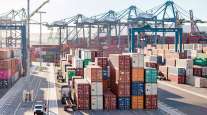Trade Tariffs Spark Surge in Lobbying

Companies and business groups, including the U.S. Chamber of Commerce, ramped up their spending on lobbying during the third quarter, as they sought to contain what they feel is damage from President Trump’s trade war.
Trump’s moves to impose tariffs on imports of steel, aluminum and Chinese goods, along with his effort to reshape the North American Free Trade Agreement, were a key driver behind efforts to influence American trade policy, according to lobbying disclosures filed with Congress by the Oct. 22 deadline.
There were more than 390 reports during the third quarter that included “tariff” as a specific lobbying issue, more than double the almost 140 reports citing tariffs in the same period last year, records show.
Hundreds of reports were filed that listed Nafta, the Section 232 metal tariffs meant to bolster U.S. producers and Section 301 duties on Chinese imports in response to a trade imbalance and allegations of unfair trade practices. Lobbying records show total spending, rather than breaking it down by individual issues.

U.S. President Donald Trump, right, and Chinese President Xi Jinping speak during a business event at the Great Hall of the People in Beijing in 2017. (Andy Wong/Associated Press)
The filings come two weeks before elections that will determine control of Congress, and lawmakers will have to decide on whether to approve a revised Nafta accord with Mexico and Canada, known as USMCA. The administration is also weighing another round of tariffs on top of the $250 billion in Chinese goods Trump has already assessed and is also seeking to rework trade ties with the European Union.
The chamber, the largest U.S. business lobby, spent $17.6 million on lobbying during the third quarter, a 34% increase from the same quarter last year.
The group declined to say how much of its spending was for trade issues but said it was among advocacy efforts that included reauthorizing the Federal Aviation Administration and reminding American voters that “a pro-growth economy and policy agenda are on the ballot” in November’s mid-term elections.
“The chamber continued to educate policy makers on the benefits of a trilateral trade agreement between the U.S., Canada, and Mexico and the danger that increasing tariffs have on U.S. workers and the economy,” spokeswoman Blair Latoff Holmes said in a statement.
The group has been a prominent critic of Trump’s tariffs, even initiating a “tariffs are the wrong approach” campaign during the quarter with a website that calculates how much retaliatory duties would cost each state and the products that are hardest hit.

The National Association of Manufacturers, which also has pushed the Trump administration to include both Canada and Mexico in a renegotiated Nafta and to negotiate a bilateral trade deal with China, reported that its lobbying spending for the third quarter more than doubled from the same period last year to $2.85 million.
A sizable portion of the activity reflected in the report was on trade, spokesman Michael Short said. The association has had more than 450 meetings and engagements with congressional offices and the executive branch this year, he said.
“This report reflects the high importance the NAM has placed on trade issues as well as other priorities important to our members,” Short said in a statement.
Trump’s renegotiated trade deal with Mexico and Canada won’t get a vote in Congress this year, Senate Majority Leader Mitch McConnell said last week, setting up a potential fight with Democrats next year.
Trump has argued that his metal tariffs have buoyed U.S. producers and that any short-term economic pain from the duties on Chinese imports and retaliation will be offset by a better long-term deal.
But hundreds of companies and associations have filed public comments and testified in opposition to Trump’s tariffs on Chinese imports — most without success — and many are now seeking exclusions for specific products. Thousands of requests for exclusions on metal import duties also have been filed.




